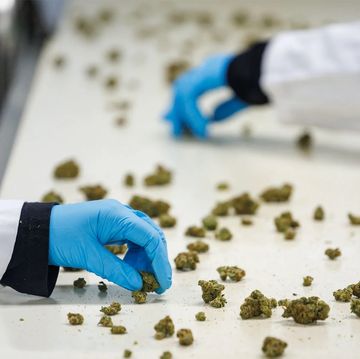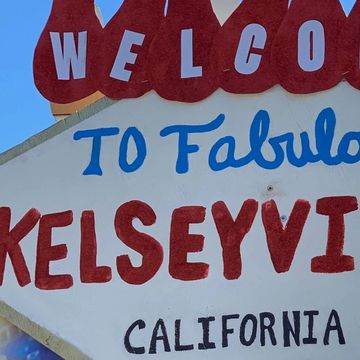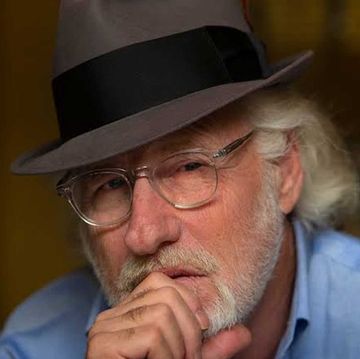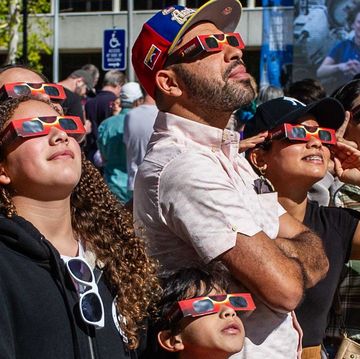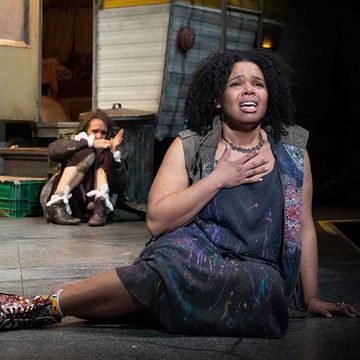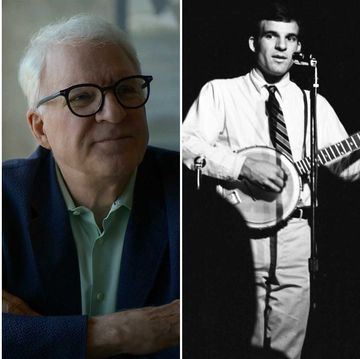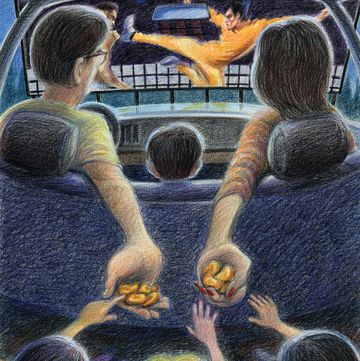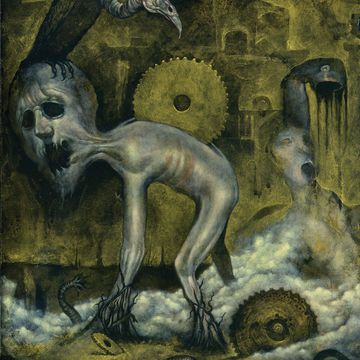Wherever this story takes you—thoughts on marriage, on food, on work, on the rise and fall of the American century, on your own life and time’s passage through it—I invite you to picture Loukas first.
Loukas, of course, being the small potato-farming village in the Arcadia region of Greece’s Peloponnese. Picture the remains of a nearby medieval tower jutting up from a scrubby hillside. The small agricultural valley below, dotted with pines and oaks and low homes of white walls and red, sunbaked roofs. And picture a young couple pondering it all one last time before boarding a ship for America—for a ragged but not unlovable bit of Bayshore Boulevard in San Francisco, where for the next half century they will gamble their lives on doughnuts and sleep deprivation.
Their stretch of Bayshore is like any grungy thoroughfare in any industrial zone—greasy body shop, gloomy carpet place, growing camp of homeless people alongside a Lowe’s—but then there it is: a strikingly red building, a flash of weathered neon, an improbable promise issued since 1970. We Never Close. From the Vietnam War through AIDS and OJ and 9/11 and Iraq, the same couple from Loukas was behind the same counter, pouring the same coffee.
Picture that previous San Francisco, so wildly different when George and Nina Giavris bought the Silver Crest Donut Shop. Nearby factories, robust and well paying, sent workers to the restaurant in droves. Truckers stopped in at all hours. Lines out the door. When George converted an old storage area into a little windowless bar in the back, Bayshore found itself with a thriving nightspot. At its peak, the Silver Crest had 20 employees. Try to picture anything close to a crowd in there now.
George and Nina run the kind of place you drive by for years, then one afternoon, your tire needs fixing nearby and at last you push through the old swinging doors. With a lurch, you unmoor from time. Before you, in faded pink and pale blue, is the kind of interior you’d believed extinct. A chipped old countertop stretches the length of seven round stools, then horseshoes around the other side. Cloudy salt and pepper shakers stand at the ready, last touched yesterday or in 1973, hard to say. A row of Triple Play pinball machines from 1955 lines a wall; stationed along the counter and at the adjacent booths are a series of personal Stereo Consolette chrome jukeboxes. A menu hand-lettered on what might be sheets of old plywood lists the offerings—burgers, eggs, fried ham, hotcakes. Beneath it, a door leads to the old barroom. Save for the effortful warming of an old carafe, the diner is silent.
You’ve already eaten, but Pam gauges you need eggs. She’s new here—started a mere three-plus decades ago. She puts in the order, and you sit. The wind blows, the doors creak open, a leaf skitters in. Hard to pinpoint exactly when the clock stopped, but judging by the fonts and the color scheme and the pinball and the fried ham and the jukebox selections and somehow the quality of the air you breathe, the planet’s orbit of the sun halted in the late ’70s or early ’80s. So thorough is the effect that occasional intrusions of modernity—the chime of a phone, a person under 40 entering—register simply as glitches in the code and thus fail to break the spell.
It shouldn’t be pleasant. Traffic roars down Bayshore, needles gather in the gutter. Plus, despite its best efforts, San Francisco has hung on to plenty of charming old dives. But something’s different here. The quality of the light or maybe the summery hum of the ancient kitchen fan gives the place a soothing stillness. The outside world doesn’t quite disappear—it becomes more of a strange memory: What was all that about?
I first came in the early aughts. The doors of possibility opened wider here. Strangers talked to strangers; different genres of person mixed. Men, elsewhere reticent, chatted with one another, and not just about World War II. In the wee hours, I watched George sleep standing up. One night, I fell into conversation with a disheveled fellow who periodically roamed Bayshore. Later, I heard he was a prince back on his island nation.
It was a reprieve from something. The city was caught up in tech euphoria at the time, or it was caught up in pushing back against tech euphoria. Just up the hill from Bayshore, the 101 was a river of Google and Facebook and Apple buses. Over in the Mission, the gentrification wars raged white-hot. But the Silver Crest wasn’t caught up in anything. It existed outside of time.
I wrote a short article about the place, fancied myself a budding regular, imagined coming in till I was as old as George himself. (George would still be here; he told me he planned to live to 149.) But then I had a kid, then another, and life—mine but also capital-L Life—somehow started to feel too complicated for mellow afternoons at the chipped old counter. One day I realized I hadn’t seen George or Nina in a decade.
A cold spring wind whips along Bayshore the afternoon I first return, the sun dull and pewter overhead. A couple huddles in the bus stop across the street. Up the scrubby embankment behind the restaurant, three haggard men stretch a tarp. I push open the heavy wood doors and am again enveloped in that familiar stillness. The jukeboxes gleam hopefully; the mismatched fluorescent bulbs flicker. A middle-aged man is absorbedly plowing through his eggs at the far end of the counter. A couple of the menu items—liverwurst and deviled egg sandwiches—have had their prices removed: a quiet passing. Otherwise, nothing has changed.
I become a budding regular again—daytimes at first, when Pam and the longtime cook Agusto are here. Nina sits in the far booth or drifts in and out of the kitchen. I recognize some of the old faces—there, still tall and lean and gentlemanly, is Jeff Charles, a retired pipe fitter with the San Mateo local. On every visit, he politely requests the usual: wheat toast, jam, change for the Triple Play machines.
“Hot in the kitchen?” he calls to Agusto.
“Cold in the freezer.”
You could do worse than to age as the Silver Crest ages—no struggle, full acceptance. The bar jukebox works except when it doesn’t. The Triple Play balls sometimes get stuck. Want a soda? You’ll be having Sprite. The food itself, meanwhile, is surprisingly good. I endorse the bacon and eggs without reservation. George still makes the doughnuts by hand each day, and Agusto has been cooking here since 2012. One day, we attempt some rough math. I calculate half a million eggs have been served here.
This article appears in Issue 25 of Alta Journal.
SUBSCRIBE
When I tell Pam I’d like to write about the place, she passes the request on to Nina, currently eyeing Bayshore out the window. The Silver Crest matriarch is short, with thick glasses and a wary frown. I receive an appraising glance, do my best Nice Boy Cause No Trouble. Nina winds a paper napkin around a finger. Finally, she shrugs a lukewarm blessing and turns back to the window.
Once again, I find the Silver Crest a reprieve from something. Outside those doors, San Francisco teeters, democracy teeters, the ice caps teeter, sense itself teeters. Velveeta has made a nail polish. AI might destroy civilization. What is my opinion on granfluencers? Oreo Thins partners with Microsoft 365 to make a film about dogs for the sake of workplace mental health. But here there’s no room for nonsense. You order your food, you eat your food.
My visits become a way of marking time and also thwarting it. The day Trump is first arraigned on federal charges, Nina sits in a booth, arms crossed, a leery eye on the world outside. The day my daughter graduates from middle school, my emotions pinwheeling, Nina sits in the same booth, still watching. You order your food, you eat your food.
Around 1 a.m. one night, I park my car, push open the doors, and walk through the empty diner to the bar in the back. On the jukebox, a mix of midcentury Greek folk tunes and ’70s soul plays for nobody. There, standing at the bar he built himself during the Nixon administration, is George.
His thinned white hair is combed back, his collared sweater loose around the arms. He’s noticeably older than when I saw him last—a marked stoop, a pronounced curve to his spine. But when we catch eyes, his mischievous twinkle is bright. He pours our customary ouzos, and I ask how things have been.
The question disappoints him; I am basic.
“Nothing change. Everything fine.”
I know from Pam that a pipe in the kitchen needed fixing earlier in the day, which required George’s oversight. So, having done the evening shift before that, he’s now into his 32nd hour on his feet. But he’s chatty. He tells me about the 24-hour door-and-window factory that was eventually replaced by the McDonald’s across the street. Then he’s talking about the history of the Peloponnese and then about the laws governing late-night hours for an establishment like his.
What’s the future of the place? I ask at one point. I’ve heard from a few regulars that his family wants him to start winding things up—he’s 84.
I might as well have been asking about the future of gravity. He points at the sign out front—We Never Close—and moves on to more practical questions.
“ ’Nother?”
I gather it’s a rhetorical question as he reaches for the ouzo. I vow silently to keep him company till dawn. I’m home by 3.
George had a promising job as a mechanic in Greece when he met Nina. But the country was changing. Potato prices had fallen, and young people were leaving villages like theirs. Nina already had family in the States. It just made sense. She and George bought their tickets, and that was that.
When I first started coming here, Nina would tell me about the San Francisco they discovered upon arriving. You put on gloves to go downtown. It was warm, people were friendly, the airport was close. Out on Bayshore sat an old doughnut shop, first erected decades earlier. She and George made an offer, and the keys were theirs by 1970. They still haven’t used them.
Right away, George established himself as a tough but loving presence on the street. Pop, he was called. One night that first year, he tells me, he noticed from across the restaurant one of his waitresses acting unusual. He walked around the bar for a closer look and saw that a young man was pointing a gun at her.
“What did you do?” I ask.
“I shot him,” George says. “In the leg.”
In court, the would-be robber’s mother was deeply ashamed. George felt for her. The boy had made a mistake. Somehow George was able to extract from him a promise: For the rest of his life, he would never rob anyone ever again. There was nothing to be done about the gun charge, George tells me. But when the judge asked what damages he’d like to be compensated for, he said none.
A decade or so after the attempted robbery, George was working the bar when the young man walked in again. With him this time was a woman—his wife. He had turned his life around, and he wanted to thank George.
That’s not the only story I hear involving George’s pistol. But mostly what I hear are accounts of him not needing it. Something in his manner lends itself to peace, regulars tell me.
On one of my late-night visits, I’m struck by how isolated the place feels—how jarring, frankly, it seems to have one’s doors always unlocked. Bayshore has downshifted into its scruffy after-hours self. Cars zip by intermittently, seemingly eager not to linger. Someone’s pounding against the glass at the McDonald’s across the street. Aside from me and two older guys eating at the counter, the Silver Crest is empty when someone pushes open the doors from the sidewalk.
Immediately the atmosphere shifts. The man has a nervous energy, carries a leather belt, keeps wrapping it around his fist. He announces he wants pizza. No pizza, George says. The man starts muttering, paces along the side of the counter. Is there food here? he wants to know. Does this kind of place serve food? One of the guys says there’s breakfast. The man is twitchy. He wants pizza. George watches him. Pizza!, the man shouts. He lowers his voice. All he wants to know is whether there’s pizza. No pizza. The men get ready, I get ready. But George is unfazed. The man fiddles with his belt, looks us over. Maybe George has magical powers, or maybe the situation naturally de-escalates. The man mumbles something and pushes the swinging doors open and wanders off into the night.
We never close. As best I can figure, it’s a promise born of both love and pragmatism. As long as George is here, pouring drinks or making doughnuts, opportunistic burglars will have to find somewhere else to rob. Indeed, it was this thinking that informed George’s pandemic policy. The policy was: Stay open. A couple of regulars tell me the health department ordered him to close at one point, but George just pointed at the sign. The place remained open from day one.
Of course, built into the Silver Crest’s simple promise is a chain of wildly less simple ones. To never close means stocking and running a restaurant in busy years and dead ones. We never close means 12-hour shifts, or 16 if something comes up, or 24. It means at 3 a.m. George is bartender, cook, janitor, maintenance man, and security guard. It means never locking the doors, no matter what.
Most unfathomable, we never close means this: Nina works days, George works nights. Since 1970, the Silver Crest has been a marital experiment disguised as a doughnut shop. A marriage in shifts. Yes, they have a house, but it’s for showers and sleeping; this is home.
I do my best to get either of them to talk about this arrangement. Hell, I do my best to get them to talk about the pancakes. But a doughnut shop omertà hangs over the place. Its finances, the Giavrises’ succession plans, even just reflections on the weather—such matters undergo an epistemological metamorphosis under this roof. Your burning curiosity gets politely swatted away so many times that eventually your only question is why you needed to know in the first place. Be here now. Eat some eggs now.
“He is nice man,” Nina tells me one day at the height of our intimacy. “We never fight. He is nice man.”
Feeding people has never been a great way to get rich, but over the past decade, the restaurant sector has fully wandered into the perfect storm that is late-stage capitalism in America. The housing crisis means your line cooks and waitstaff can’t afford to live within 30 miles. Inflation never lets up. The rising cost of tomatoes means your BLT is now a special-occasion item. The gig economy means delivery apps chip away at your meager profits. And every time you reluctantly raise prices to mitigate all of the above, some new percentage of once-regular customers decides it’s no longer worth it.
Then came the pandemic. Like everywhere, business at the Silver Crest has dropped off dramatically since 2020. Customers have scattered or developed other routines or decided money’s too tight for diners.
All of which makes the concentration of die-hard regulars—almost all of them men—delightfully high. One morning, a man in a leather vest and with a scraggly white beard sits beside me at the counter and begins lining up pill bottles. Victor Cassar is 84 and has come in for breakfast nearly every morning since his early 30s. Some men mellow with age; Victor doesn’t appear to suffer from this condition. By the time he starts removing his multiple leather wallets from various pockets—“ ’cuz I’ve got so much money”—I’ve watched him hit on a woman half his age. He accepts his rejection sweetly, and soon he’s talking with a guy to his left.
The guy says something about motorcycles.
Victor slaps the counter.
“Hang on.”
He walks out to his black Trans Am, fishes around, and returns with a tattered envelope. For the next 10 minutes, Victor pulls out memorabilia from his time in the Hells Angels: old photos, newspaper clippings, pictures of bikes he’s loved.
“Don’t forget your pills, Victor,” Pam says.
He nods but has slipped further back in time. His dad worked as a mover here in the city. “Mean old bastard, god rest his soul.” Victor joined the army, then managed to get a commercial license despite never having learned to read. Drove a mixer for 41 years. Nowadays, he spends his time here or driving down south with his buddy to buy lottery tickets.
“What else are you gonna do?” he asks.
Another morning, I meet Guido Brenner, who guesses he’s been coming here for at least 15 years. He’s got stubbled cheeks, tattooed arms. His grandfather ran Pier 39 back in the rough old days, before it morphed into a cheerful postcard of itself. He takes city history seriously, sees the Silver Crest as one of its spokes. He’s worked the door at the music club Bottom of the Hill—another spoke—for more than two decades, and when bands finish their sets in the early-morning hours, he sends them here. Sometimes he comes himself—no kitchen where he lives.
“I can always get parking, the eggs are fluffy, and they have a good cut of bacon,” he says.
Next, someone named Doc is joining our conversation from the other end of the counter, and then a guy named Ronnie, and then someone else whose name I don’t get. I duck out of the conversation to jot some notes down, and when I look back up, the discussion has forked into two—one about FDR, one about Bugs Bunny. Later, Doc bellows “Stay up!” to everyone when he leaves, and soon Jeff Charles is pushing through the doors.
“Hot in the kitchen?”
“Cold in the freezer.”
Jeff’s over at the Triple Plays. He’s the jukebox today; he works the game with his right hand while a Donald Byrd number from 1975 drifts tinnily out of the phone in his left. I’m lost in a daydream when I hear the clunking of the balls stop. Jeff walks over.
“Here’s a thought for you, Chris,” he says—he’s gradually taken an interest in my notepad—and slides me a paper napkin. Written on it in ballpoint is the following: “Acknowledged truth is freedom. Indeed!!!”
I thank him, ask what inspired it. He points at his head.
He goes back to his game and his music, but a little later he returns, and we talk a bit. I ask if any memories stand out from his four-plus decades of coming here. Jeff’s Black, and I’m hoping he’ll say something about a Silver Crest truism I hear periodically—that the place has long been home to some rare San Francisco diversity. Journalists are always doing this, slipping into pseudo-anthropologist mode. It’s why we’re always caught off guard when someone says something beautiful instead.
“I do have a memory,” Jeff says.
In the late ’70s, he picked up a hitchhiker on Highway 1. As they drove, the hitchhiker taught him a little Greek. One day at the Silver Crest, one of Nina’s nieces was doing a stint. Jeff looked up at her from the counter.
“Christos anesti,” he said. Christ is risen.
“Her face just lit up,” Jeff says now, decades later. “It was like the sun shining in here. I’ll never forget it.”
Summer arrives, and my afternoons here stretch out, sweaty and listless. The vinyl of the booths sticks to my back as Pam swans over to refill my coffee.
Visit a 24-hour doughnut restaurant enough and a hazy question will eventually come into focus: Why, exactly, am I doing this?
I consider the possibility that it’s just garden-variety nostalgia drawing me in. That is a note in certain conversations here, a fondness for a previous and generally imaginary time. And it just might be misbegotten wistfulness that sends me one day into the city archives, hunting down previous iterations of the diner: waitress want ads from the ’40s, Silver Crest Donuts bowling team scores from the ’30s. From there, I pivot to the brand of jukebox here, how it was born in the ’20s, rose to prominence in the ’50s, became utterly ubiquitous on the planet—and now is just a curio memorialized on an old website run by a guy named Tony. I learn that in 2009, Tony died too.
If at some level I’m searching for a different San Francisco than the one currently around me, I find it, among old ads for undertakers and engravers and hoisting machinery and steam pumps and detective services and the delivery of pure country milk, nickel a quart.
But it dawns on me that something more interesting is happening at 340 Bayshore Boulevard. Yes, the fonts and the music and the vibe hark back to an earlier era—but ultimately that’s just window dressing. The Silver Crest is not a nostalgic redoubt but a metaphysical one. The Giavrises have jammed their spatula into the gears of the cosmic clock. It’s the boldest thing you can do in this life, the biggest swing you can take—halt the incessant ticking, or at least mount a noble resistance. Summer will become fall; the vinyl of the booths will become cool to the touch. But Pam will refill my coffee as always, and Jeff will banter with Agusto, and Nina will keep an eye on Bayshore, and George will live on to 149 and he can reevaluate then if he wants, it’s OK, everything fine.•
Chris Colin’s work has appeared in The Best American Science and Nature Writing. He produces the podcast Longer Tables with José Andrés.









